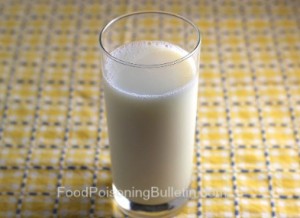Health Canada has issued a health advisory warning consumers of the dangers associated with drinking raw (unpasteurized) milk. The advisory states that it is precisely because of those dangers that milk sold in Canada must be pasteurized.
 Raw milk, which can contain bacteria such as E.coli, Salmonella and Listeria, has been linked to foodborne illness outbreaks. Victims of these outbreaks suffer a range of symptoms including fever, vomiting, bloddy diarrhea, kidney failure, miscarriage and death. Children, the elderly, pregnant women and those with weakened immune systems are at an elevated risk.
Raw milk, which can contain bacteria such as E.coli, Salmonella and Listeria, has been linked to foodborne illness outbreaks. Victims of these outbreaks suffer a range of symptoms including fever, vomiting, bloddy diarrhea, kidney failure, miscarriage and death. Children, the elderly, pregnant women and those with weakened immune systems are at an elevated risk.
Pasteurization kills dangerous bacteria that cause illness while preserving the nutritional properties of milk, the advisory states. Canada made pasteurization of milk mandatory in 1991. Since that time, the number of foodborne illness outbreaks associated with milk has dramatically decreased, according to the agency.
Selling raw milk that is not intended for further manufacturing is illegal under the Food and Drugs Act. However, some people who have sampled raw milk while visiting farms have become ill. The agency notes that while some Canadians believe raw milk is healthier than pasteurized, “any possible benefits are far outweighed by the serious risk of illness from drinking raw milk.”
Cheese made from raw milk is not illegal and is allowed for sale because the manufacturing process helps to eliminate dangerous bacteria, the advisory notes. However, those in the high risk group-children, the elderly, pregnant women and those with weakened immune systems, should avoid eating cheeses made from raw milk, especially of they are soft, semi-soft or blue-veined.





Why do doctor say pasteurized milk does not contain sufficient nutrition for infants but is OK for adults and why do doctor say you shouldn’t give infants raw cows milk because it may contain bacteria but recommend raw breast milk over formula?
Cow’s milk is not a good food for infants because, when that’s the only thing infants are fed they will be deficient in vital nutrients. Cow’s milk does not have all of the nutrients that infants require, such as essential fatty acids, vitamin E, and iron. Breast milk does. Cow’s milk also has too much protein, sodium, and potassium. Breast milk has the perfect combination of nutrients for an infant.
And breast milk does not have the pathogenic bacteria that raw milk does because women’s breasts are not located right next to the anus. A cow’s udders are located right next to her anus. That’s where the pathogenic bacteria in raw milk come from.
Furthermore, breast milk contains antibodies that pass from the mother to the child. Cow’s milk has enzymes that human beings cannot use.
I was told that cow manure can be put directly on a wound as a dressing, is this not true, and I read that inspectors usually find no pathogens in cow manure at raw milk dairies, is that true?
No, that is not true. I’ve seen it mentioned on magic sites, but it’s hardly recommended therapy. And inspectors do find pathogens in cow manure. In fact, improperly composted manure has caused foodborne illness outbreaks.